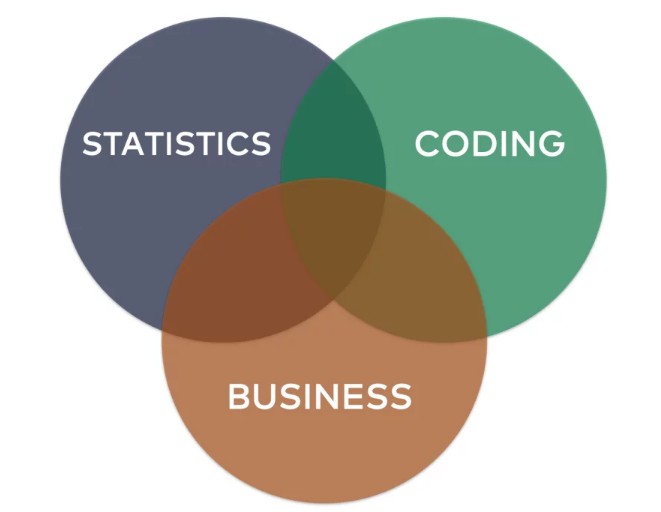It can be much simpler to explain the results, both to yourself and to an outside viewer, if domain knowledge is incorporated into your architecture and your model. Every bit of domain expertise can be used as a stepping stone through the machine learning model’s opaque black box.
What Is Data Science?
We must first comprehend what data science actually is before we can respond to why. According to Wikipedia “Similar to data mining, data science is a multidisciplinary field that uses scientific methods, processes, algorithms, and systems to extract knowledge and insights from data in a variety of forms, both structured and unstructured.”
Data science is simply a field where raw data is processed into information.
What Exactly Does Domain Knowledge Entail?
The term “Domain Knowledge” has been in play even before data science became popular. It refers to the understanding of the environment in which the target (i.e. software agent) operates.
We can use the same definition in data science to say — “Domain knowledge is the knowledge about the environment in which the data is processed to reveal secrets of the data”. To put it another way, domain knowledge is the understanding of the field to which the data belongs.
How Does Domain Expertise Affect Data Science?
You may have studied data science and machine learning and used techniques like regression and classification to make predictions using test data. However, we can only fully utilize an algorithm and data when we have some kind of domain knowledge. With the use of such data knowledge, it goes without saying that the model’s accuracy also improves.
When working with the pertinent data, for instance, the knowledge of the automotive industry can be applied as in the following example: Let’s say we have the features Horsepower and RPM, from which we can derive the formula for an additional feature called Torque.

Are Domain Knowledge And Machine Learning Important?
A lengthy process is involved in creating machine learning models. You might assume that numbers are just numbers and that it doesn’t matter what each of a data set’s features means when it comes to spitting out insights with the potential for real impact, whether you’re working with labeled or unlabeled data. It’s true that there are many excellent machine learning libraries available, like sci-kit-learn, that make it simple to compile some data and insert it into a pre-made model. It’s easy to get the impression pretty quickly that machine learning can handle any challenge.
That mindset, to be honest, is that of a novice. All of your ignorance is still hidden from you. When using machine learning models, data sets provided in machine learning courses or those you can find for free online are frequently already prepared and convenient to use, but once you apply your knowledge and skills outside of the classroom and into the real world, you’ll encounter some new difficulties.
Many people think domain knowledge—extra information about the field or area to which the data relates—is superfluous. And it’s sort of accurate. Do you require expertise in the field in which you are building the model? No, you can still build models that are reasonably accurate without it. Deep learning and machine learning are, theoretically, black-box techniques. Consequently, you don’t need to have a thorough understanding of the subject or even to closely examine the data to incorporate labeled data into a model.
You will, however, have to bear the costs if you choose this course of action. This is a very inefficient method of training classifiers, and in order for them to function correctly, you’ll need a ton of labeled data sets and a lot of processing power to create precise models.
It can be much simpler to explain the results, both to yourself and to an external viewer, if domain knowledge is incorporated into your architecture and your model. Every bit of domain knowledge can be used as a stepping stone through the machine learning model’s “black box.”
It’s very simple to assume that domain knowledge is not necessary because, for many visible data sets like COCO, the minimal domain knowledge that is needed is a natural byproduct of seeing humans. The presence of cancer cells in even more complicated data sets can still be seen by the naked eye despite the lack of specialized knowledge. Without specific medical knowledge, you can perform a basic comparison of the similarities and differences between cells.
However, more so because they are such routine tasks for us, we may not even be aware of how we are using our domain knowledge in NLP and computer vision, two areas where it’s easy to think that domain knowledge is completely unnecessary.
The value of domain knowledge becomes immediately clear when working in fields like outlier detection, which isn’t a typical human task.
Why Are Domain-specific Skills Crucial For Data Scientists?
Interrelated to each other, yet clearly distinguishable, three aspects of Domain Knowledge, a Data Scientist should keep in mind, can be defined in context to the —
- The source problem, the business is trying to resolve and/or capitalize on.
- The set of specialized information or expertise held by the business.
- The exact know-how, for domain-specific data collection mechanisms.
On the other hand, a regrettable misconception that the general public has about data science and machine learning is that these fields are like the mythical Noah’s Ark, ready to solve every trivial issue ever.











